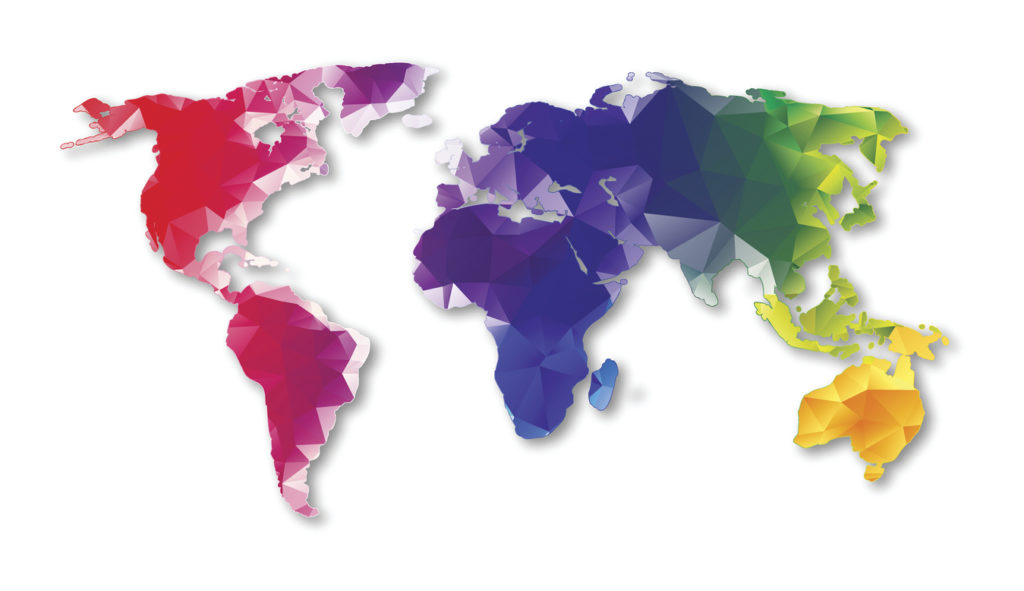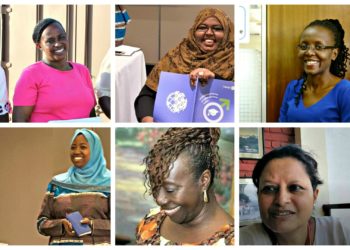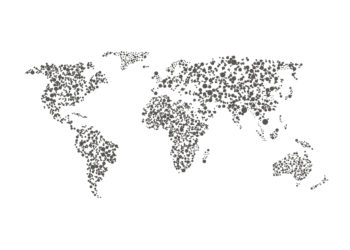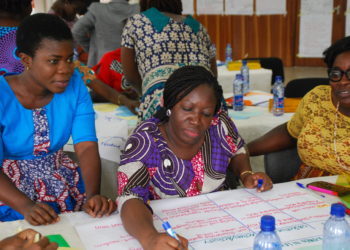Editor’s Note: Today’s post is by Dr. Naveen Zehra Minai. Naveen holds a PhD in Gender Studies from the University of California, Los Angeles. She has taught in Pakistan for the past three years. Her research is interdisciplinary, and focuses transnational literary and visual cultures in South Asia and North America. Her areas of study include women of color and transnational feminisms, queer of color critique, sexualities, masculinities, cultural studies, postcolonial studies, and settler colonial studies.
Academia is a global network of institutions, people, and projects, and the production and circulation of academic knowledge is a globalized concern and goal. However, many scholars face particular challenges because of their locations. Here I expand on a recent discussion I had on Twitter about the problems scholars based in the Global South face, and the solutions my colleagues and I have come up with.

Some notes before I start: first, I understand that the term ‘Global South’ is problematic (see, for example, this article or this one) and I do not subscribe to the values that inflect this term. I used this term in my Twitter discussion as a popular shorthand to indicate regions in Africa, Asia, Europe, and the Americas which are not part of institutionalized networks of power, authority, visibility, and access in global academia.
My research involves women of color, transnational and Indigenous feminism, with the goal of developing an understanding of these networks as embedded in globalized grids of economic, social, and economic power, including historical and contemporary formations of colonialism, settler colonialism, and neocolonialism. Thus, I am able to recognize the difficulties marginalized scholars face in academic centers of authority, visibility, and access alongside the challenges faced by scholars in the Global South.
Second, it is important to recognize and acknowledge the privileges of class and location within the Global South. My colleagues and I are part of upper middle- to upper-class social and economic structures and we live in major urban hubs. This means that we have access to money and infrastructure (transport, electricity, internet, computers) which offers capacities to manage many issues. This infrastructure is unwieldy and precarious but it is present. Therefore, we are not representative of how poor, working-class, and lower- to middle-class scholars in the Global South manage these problems.
Third, the challenges I discuss here pertain to experiences of scholars in the humanities and social sciences, such as gender studies, literature, history, urban studies, sociology, philosophy, psychology, anthropology, and media studies.
Access to research
One of the major issues we face is not having institutional access to journals in our fields. This means that we don’t know about the latest conversations happening in our disciplines, both in terms of research and teaching. This has adverse effects on how and what we teach, and what scholarship we are able to engage with for our research and writing. Not being up to date with the latest results compromises our effectiveness in designing and conducting research, submitting articles for publication, proposing special issues of journals or book series, sending book proposals to relevant presses, and successfully applying for conferences.
Our university management does not prioritize subscriptions to journals in the social sciences and the humanities because universities managers (deans, associate deans, academic committees, boards of governors) do not value these fields and disciplines, especially in comparison to fields such as business and medicine. The social sciences and the humanities are seen as not valuable because they are perceived as fields without economic value, hence without social and political value. And economic value is, of course, defined according to a narrow understanding of both ‘economic’ and ‘value’ where both often mean profit and loss within a neoliberal capitalist framework.
In addition, initiatives that aim to provide resources to scholars in the Global South by working with international publishers often have an emphasis on the fields of applied sciences, medicine, agriculture, and environment studies. Moreover, they often have an emphasis is on policy-focused research, which is not always the focus for academics in the social sciences and the humanities.
The problem of value is also manifested in costs: our universities cannot afford to pay for subscriptions in currencies such as the US and Canadian dollars, Euros, or British pounds sterling because currencies from and of the Global South are weak. For example, 1 USD = PKR 123 as of August 7, 2018. This is one reason why the availability of books and journals as open access is so important for so many researchers. However, open access is not the rule in globalized academic institutions (including university presses), and it can also be an expensive and difficult model even for academics in the Global North to implement and maintain. Furthermore, open access as an approach does not in and of itself solve all issues of access, authority, and resources for research. As the recent case of HAU shows, open access as a model does not guarantee the transformation of toxic formations of power in academic research and publication both for marginalized scholars in the Global North and scholars in the Global South.
Libraries
We don’t have well-supplied and well-organized libraries on or off campuses for social sciences and humanities. Alongside a dearth of academic books, there is also a lack of fiction and nonfiction books, for example, novels, short stories, poetry, plays.
My colleagues and I are fortunate to have a department chair and a library committee that have so far never told us no. However, there is a monetary limit to each book that we can order (art history books, for example, are priced out of this range), and our requests often take anywhere between eight and 12 months to arrive. Not only does this make research and writing difficult, it also makes teaching difficult in terms of designing syllabi and availability of relevant and up-to-date reading material for a course.
There is another problem with ordering books through our departments and/or university libraries: books on topics such as religion and sexuality in particular can get us into trouble with fellow faculty, university administrations, and even students. This is because such topics are controversial in the social and political contexts many of us are located within, and there is no institutional or state protection for academics. Indeed, it is often our institutions and states that scholars have to be most wary of and careful about. Trouble can be legal, economic, and physical, including informal censure from institutional authorities, being fired, being threatened, and/or being physically harmed.
Travel
Travel is not easy if you are a scholar who holds a passport from a country in the Global South. We have to apply for visas for research and conferences. Visa applications are time-consuming, expensive, and require a lot of supporting documents, for example, travel insurance, air tickets, hotel reservations, verification of employment, bank statements, and invitations. For most countries in the Global North, you have to apply at least a month in advance of your intended travel dates.
You also have to run around a lot between authorized visa application management agencies, consulates, and/or embassies for approval and submission of your application packet, visa interviews (which may involve travel to another city), and collection of your passport. And approval of a visa is not guaranteed even if you have official and/or institutional invitations and authorizations.
It’s not just about applying for visas: it is also about the traveling itself, from the Global South to the Global North. Many of us earn in weak currencies so that, alongside visa fees, airfare, accommodation, food, local transport, is very expensive for us. Add to these costs registration fees for conferences.
This means that our research is severely restricted in scope in terms of both time and place, especially any archival or comparative work we would want to do. We also cannot attend conferences in our fields and disciplines. Furthermore, our passports also mean that we are at a major disadvantage from the start when it comes to applying for grants, fellowships, scholarships, and jobs. All of these issues hinder how we learn, contribute, and develop as scholars, and how our careers advance.
Scarcity of Scholars
Another issue we face in academia in the Global South is that we are severely short staffed in terms of both full-time and visiting faculty. Some of my colleagues and I have taught three courses while supervising up to 12 students for their individual senior theses alongside doing academic program development and administration. In one semester. This is worsened by the fact that many colleges, universities, and other higher education institutions in our regions do not value scholars with MA degrees for their expertise and labor, yet still expect them to do all of that work.
This chronic shortage of academic staff also makes planning for each semester and each year difficult because there are never enough of us to teach core, introductory, and elective courses equitably. Faculty often have to teach over 90-100 students in core and introductory courses one semester after another with no break, and caps for electives cannot be enforced because there aren’t enough courses for students to take.
Addressing the Challenges
So how do we as individual academics manage these issue in the Global South?
- We get personal subscriptions to journals and associations if/when we can afford them
- We ask our friends in the Global North to send us PDFs obtained through their institutional subscriptions
- We use our personal libraries that many of us have built from our time in graduate school in the Global North
- We apply for conferences as much in advance as possible, up to a year in some cases, so that we have time to obtain a visa if our proposals are accepted
- We also try to apply for conferences and plan international research in countries we may already have visas for
- We try to design collaborative research projects with scholars in the Global North. This is very difficult because you have to coordinate goals, schedules, capacities, and capabilities across institutions and states both
Scholars and others working in scholarly communication in the Global North can help by:
- Organizing video conferencing and/or Skype facilities at conferences. I do appreciate that many scholars in the Global North in disciplines such as literature, gender studies, and ethnic studies also do not have funds to contribute towards international air travel, so this would be a cost-effective alternative for them as well
- Building costs of international visa fees, air travel, and accommodation discounts into funding applications for conferences and workshops whenever possible
- Building time into calls for papers and presentations at international conferences for scholars in the Global South to apply for visas if our submissions are accepted
- Waiving conference registration fees, and/or offering discounts or installment plans for association and journal subscriptions to scholars in the Global South who earn in weaker currencies
- Hosting conferences in places more accessible and affordable for those of us who earn in weaker currencies
- Naming scholars in the Global South as co-principal investigators in collaborative research projects, funding applications, and conferences so that we are receive adequate funding and equal recognition for our labor
- Learning about conditions in the country of origin of international graduate students, junior faculty, and early career scholars to help us navigate an international job market, including the particular challenges we face when applying for fellowships, postdoc positions, and jobs in the Global North
- Educating scholarly publishers about the need to include more social science and humanities resources in the access initiatives they support.
Discussion
2 Thoughts on "Guest Post: Challenges for Academics in the Global South — Resource Constraints, Institutional Issues, and Infrastructural Problems"
We have run electronic conferences for many years at https://sciforum.net/conferences?format=electronic. The experience is, of course, different to a physical conference, but we have found a good level of engagement from scholars across the globe. They can also be used to supplement and enhance a physical conference, reaching a broader audience.
Dr. Minai touches on some very real and tangible challenges many academics in developing countries face, not only regarding access to resources, but also logistical challenges, such as visas, endless bureaucracy and lack of resources and funding.
With regard to access to resources, I’d like to highlight some initiatives that have been undertaken to address these challenges. Research4Life (http://www.research4life.org) is perhaps the largest and most well-known as such being a public-private partnership between UN entities, scholarly publishers and academic libraries. Through its 5 programmes, it provides access to scholarly literature (both subscribed and open access content) from over 175 publishers in more than 100 lower income countries (including Pakistan).
Access is just the beginning: these programmes provide critically important training on information literacy and capacity building for students, researchers, librarians, policy-makers and professionals. Within the various programmes Humanities and Social Sciences content is included, but perhaps not always as visible as we would like it to be. With the launch of the 5th and latest Research4Life programme, ‘Global Access to Legal Information’ (GOALI — http://www.ilo.org/goali), the area has been greatly expanded to cover legal content, with a strong focus on gender equality and areas such as labour law, environmental law and human rights. Please help spread the word, since the more the resources are used for the benefit of the academic community the better it is!
Research4Life is only one of many valuable resources: there are other initiatives such as INASP’s AuthorAid (http://www.authoraid.info/en/) which also offer important support for researchers and authors no matter the discipline.



